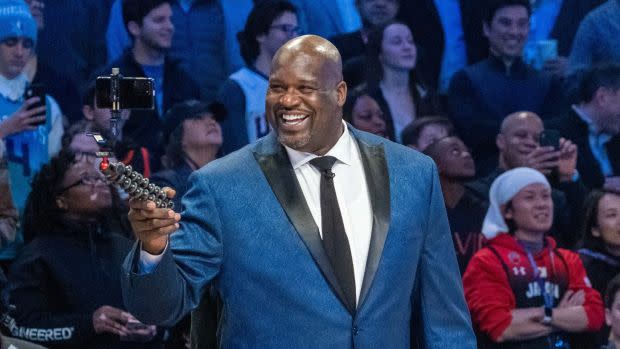What do Shaq, Forever 21, and Elvis have in common? Wall Street is about to find out
- Oops!Something went wrong.Please try again later.
- Oops!Something went wrong.Please try again later.

Authentic Brands Group may not be a household name in the US, but many of its properties are. Marilyn Monroe, Forever 21, Muhammad Ali, Sports Illustrated, Elvis Presley, Juicy Couture, and Shaquille O’Neal are just a few of the more than 30 names and brands for which the company holds the intellectual property rights.
In 2020, that portfolio generated more than $10 billion in merchandise sales globally, contributing to ABG’s $489 million in revenue for the year, it said in a prospectus to list on the New York Stock Exchange filed last week with the US Securities and Exchange Commission (SEC). ABG, however, didn’t directly produce any of those products. “We don’t manage stores, inventory, or supply chains,” stated the company’s founder and CEO, Jamie Salter, in its SEC filing. “We don’t manufacture anything. We are a licensing business and are purely focused on brand identity and marketing.”
The model has been lucrative for ABG. Its revenue has been on a steady climb for years, and when it goes public, it could be valued at as much as $10 billion, sources told Bloomberg.
What is a brand?
When ABG refers to the brands it owns, it's talking about "trademarks, copyrights, publicity rights and/or other intellectual property rights," it explained in its filing. Some of them it owns through joint ventures. In the case of a living celebrity like O'Neal, the company may consult with them on the use of their name and likeness.
ABG licenses these properties out to other companies in exchange for royalties, while retaining approval rights over how its brands are used and marketed. In the past it has licensed Elvis Presley to the US post office for a stamp, and Muhammad Ali to Under Armour for a line of sports products.
Last year, it collected money from a "global network of 1,000 licenses across approximately 800 licensees, including manufacturers, distributors, wholesalers, retailers and e-Commerce partners," it said. It's the licensees who bear the work and expenses from activities like manufacturing and handling distribution and sales. It noted that 82% of its revenue came from its lifestyle division made up of clothing and home goods brands, while 18% came from the entertainment brands that include its big celebrity names.
Salter started his career selling sporting goods before acquiring a snowboarding company and cofounding another. He created a financial services holding company, and then in 2010 started ABG with $250 million. Its first big move in entertainment was to buy the Marilyn Monroe name. "What we saw in Marilyn in many ways embodies how we look at things as a company," Salter said in the letter included in the SEC filing. "We saw a great brand in need of a partner with the capabilities needed to honor and achieve the full potential of the legacy."
ABG has kept expanding, scooping up sometimes dormant or distressed brands in entertainment, sports, and clothing and managing them into money-making enterprises. The pace of its acquisitions appears to be picking up, too, with 19 occurring in the past five years. Lately it's had its eye on troubled retail names, buying Barneys after its collapse and Eddie Bauer more recently.
The company is now the third largest licensor globally, behind Disney and Meredith Corp., a media conglomerate, and appears confident in the room it has to grow. "With our versatile model, the way we look at the world there is $13 trillion of branded commerce in our sights," Salter wrote in the filing.
Sign up for the Quartz Daily Brief, our free daily newsletter with the world’s most important and interesting news.
More stories from Quartz:
A Chinese clothing brand has found a workaround to Modi’s ban—and Indians can’t stop celebrating
Is complaining about your colleagues a fireable offense? Netflix says yes
